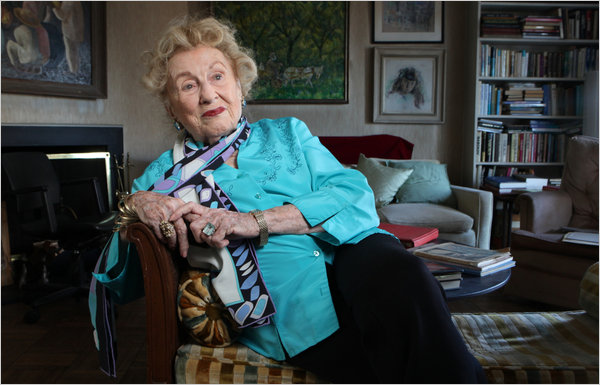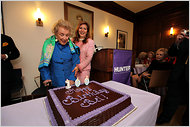When Bel Kaufman sits you down on her sofa and asks, “Are you comfortable?” the right answer, she reminds you, requires a Yiddish inflection, a shrug and the words, “I make a living.”
At 100, Still a Teacher, and Quite a Character
 |
| CHESTER HIGGINS JR/THE NEW YORK TIMES |
| Bel Kaufman, author of "Up the Down Staircase," the seminal book on the hardships and joys of teaching in New York City, celebrated her 100 birthday. |
By JOSEPH BERGER
At 100 years old, Ms. Kaufman is still shpritzing jokes, Jewish and otherwise, which is in her genes. Her grandfather was the great Yiddish storyteller Sholem Aleichem, a writer who was able to squeeze heartbreaking humor out of the most threadbare deprivation and wove the bittersweet Tevye stories that became the source for “Fiddler on the Roof.”
This year, Ms. Kaufman did something more than tell jokes. She became one of the few adjunct professors in her age cohort and taught a course on Jewish humor at Hunter College, her alma mater. One of the jokes the class dissected:
“The Frenchman says: ‘I’m tired and thirsty. I must have wine.’ The German says: ‘I’m tired and thirsty. I must have beer.’ The Jew says: ‘I’m tired and thirsty. I must have diabetes.’ ”
“We were not just telling jokes,” Ms. Kaufman said in her book-lined Park Avenue study, her eyes glinting mischievously. “We were investigating why so many comedians are Jewish and so many Jewish jokes are so self-accusing.”
“It goes back to immigration from the shtetl, from that poverty, and because the Jew was the object of so much opprobrium and hatred,” she said. “The jokes were a defense mechanism: ‘We’re going to talk about ourselves in a more damaging way than you could.’ ”
Her first triple-digit birthday party was Tuesday, and Ms. Kaufman was honored by Hunter, with a medley of playfully reconstructed songs from “Fiddler,” and other honors coming from the National Yiddish Theater-Folksbiene and the Dutch Treat Club.
Ms. Kaufman was 5 when her grandfather died, on May 13, 1916, and she believes she is the last person alive who remembers him and his impish humor.
“I remember his laugh; I remember his hand when we walked,” she said. “He used to say the tighter I hold on to his hand, the better he will write. He wrote me a letter which I treasure: ‘I’m writing you this letter to ask you to hurry and grow up and learn to write so you can write me a letter. In order to grow up, it is necessary to drink milk and eat soup and vegetables and fewer candies.’ ”
Ms. Kaufman graduated from Hunter in 1934, just 11 years after emigrating from the Soviet Union as a 12-year-old and being forced to start in first grade. Born in Berlin, she was raised in Odessa and Kiev, and the Russian Revolution was the background music of her childhood.
“Dead bodies were frozen in peculiar positions on the street,” she recalled. “People ate bread made of the shells of peas because there was no flour. But a child has no basis for comparison. Doesn’t every child step over dead bodies? I didn’t know any different.”
Ms. Kaufman’s hard work and the watchful eye of a demanding father led to a master’s degree in literature from Columbia and teaching jobs at a series of public high schools. Her 20-year odyssey became the springboard out of her grandfather’s shadow. In 1965, she published “Up the Down Staircase,” a novel about a new teacher very much like Ms. Kaufman who struggles to keep up her spirits in a school crowded with more than a few hopeful but ornery students and where memo-happy principals issue rules like not walking “up the down staircase.”
It spent 64 weeks on The New York Times’s best-seller list and led to Ms. Kaufman’s second career as a speaker.
Ms. Kaufman, who is recovering from a broken rib, refused to have her photograph taken until she changed into a more elegant turquoise blouse, scarf and earrings. But, “without vanity,” she described herself as having been a “wonderful teacher.”
Yet she recalled how difficult it was to get fully certified by a byzantine school bureaucracy. The examiners had her explain a sonnet by Edna St. Vincent Millay, and told her afterward she had given “a poor interpretation.” Having been blocked once before because of a trace of a greenhorn accent, she refused to be stopped a second time. So she did what any true aspirant would have done: she wrote a letter to Ms. Millay and had her evaluate her interpretation.
“You gave a much better explanation of it than I myself should have,” the poet wrote back, and the chastened examiners saved face by urging Ms. Kaufman to try for the license again.
She now meets former students who are grandparents. Indeed, she cannot believe that she has a son, Jonathan Goldstine, 69, who is a retired professor of computer science, and a daughter, Thea, a psychologist, who is 67. Ms. Kaufman lives with her second husband, Sidney J. Gluck, 94, who runs the Sholem Aleichem Memorial Foundation.
“He likes older women,” Ms. Kaufman said with a chuckle.
Now that her rib is healing, Ms. Kaufman intends to resume her hobby — dancing mambos and tangos at a local school. Her determination helps explain how she made it to 100, though she does not think it is such a big deal.
“It must have happened gradually, while I wasn’t looking,” she said. “I feel no different than I felt at 99, 98 or 97. Just because you live a long time, you get all this attention. Just because you survived? Of course, I survived a lot.”
